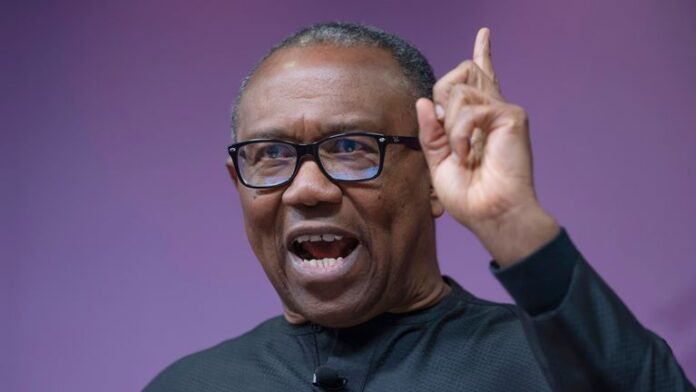Labour Party’s 2023 presidential candidate, Mr. Peter Obi, has raised alarm over what he described as Nigeria’s “collapsing security system,” saying the country is bleeding because its leaders have chosen “comfort over courage, politics over people, and power over purpose.”
In a strongly worded message posted on his verified X (formerly Twitter) account late Sunday, Obi said the events of the past 10 days show that Nigeria is going through one of its most troubling periods in recent history. According to him, the wave of killings, kidnappings, and attacks across the country should touch the conscience of everyone in leadership.
Obi noted that Nigeria has witnessed an unusual rise in negative news, ranging from terror attacks to criminal violence and institutional failures. He described the situation as “unprecedented” and warned that the country is drifting dangerously.
He said, “The past 10 days in Nigeria have witnessed unprecedented negative news, a level of chaos, insecurity, and institutional decay that should trouble the conscience of all the leaders.”
According to the former Anambra State governor, the current crisis is not an act of fate or destiny. Instead, he said Nigeria’s challenges are man-made and caused by leadership failures at different levels of government. He stressed that the nation is experiencing insecurity, lawlessness, and decaying institutions because leaders have failed to act with courage and responsibility.
“Each day confronts the nation with a new tragedy and a new reminder that the beloved country is drifting amid a clear absence of competent, compassionate, responsive and responsible leadership,” he said.
While speaking about the worsening insecurity, Obi said he received a report of yet another attack — the abduction of 13 female farmers in Askira-Uba Local Government Area of Borno State. The victims were reportedly taken by suspected Boko Haram or ISWAP insurgents.
He said the incident reflects the level of danger many Nigerians face daily, especially in communities affected by terrorism. For more than a decade, Borno State and other parts of the North-East have battled Boko Haram insurgency, which has claimed tens of thousands of lives and displaced millions.
The kidnapping of farmers, including women and young people, has continued despite repeated assurances by the government that the terrorists have been weakened. Attacks on rural communities have also worsened food insecurity as many farmers fear going to their farms.
Obi expressed deep concern over this development and said no serious country should accept such tragedies as normal.
In his post, Obi asked Nigerians to reflect on how a country blessed with natural and human resources has found itself in this situation. He said Nigeria has hardworking and resilient citizens, yet insecurity and poor governance have dragged the nation into “avoidable disorder.”
“We have all watched a nation blessed with people of strength and resilience drift into avoidable disorder. We should be asking ourselves: Are we cursed, or are we the curse?” he said.
Obi stressed that what Nigeria is experiencing is not unavoidable. Instead, it is a direct result of leaders failing to value human life and refusing to take necessary action when citizens are under attack.
The Labour Party flagbearer criticised what he described as “excuses, indifference, and absentee leadership,” which he said have become too common among those in power. He argued that a lack of seriousness in handling security challenges has worsened the crisis.
“No serious nation survives on excuses, indifference, or absentee leadership,” he said. “What we are witnessing is not inevitable. It is the direct consequence of us leaders not valuing human life.”
In recent years, Nigerians have raised concerns about the growing rate of kidnappings, banditry, terrorism, and violent crime across many states. From the North-East to the North-West, communities have suffered attacks from insurgents and bandits. In the South-East, armed groups have targeted security agencies and civilians, while the South-West has also seen cases of kidnappings and rural banditry.
Obi reminded leaders that governance is not merely a title or a political achievement. According to him, it is a duty that comes with serious responsibility — including the obligation to protect every citizen.
“We the leaders must remember that governance is not a title; it is a duty to protect every child, every community, and every citizen,” he said.
He called for a government that is present when Nigerians need it the most — one that understands the challenges people are facing and responds quickly and effectively.
“We need competence, compassion, and a government that shows up when it matters the most,” he added.
Obi also addressed Nigerians who have felt frightened or discouraged by recent events. He acknowledged that many citizens are going through emotional distress as insecurity spreads across the country.
“To every Nigerian shaken in these past 10 days, my heart is with you,” he said. “You deserve safety, you deserve peace. We deserve a government that values our lives above politics. Nigeria must rise again.”
His message comes at a time when many Nigerians are questioning the ability of the authorities to keep them safe. Several civil society groups have called for urgent reforms in the security sector, while others have demanded more transparency from government officials.
Since contesting the 2023 presidential election, Peter Obi has remained vocal on issues of insecurity, economic hardship, and governance. He has often criticized what he sees as weak leadership and poor policy direction, especially regarding safety and welfare of citizens.
During the 2023 campaigns, Obi repeatedly promised to prioritize security and revamp intelligence structures if elected president. Although he did not win the election, many of his supporters — especially young people — continue to see him as a strong voice on national issues.
